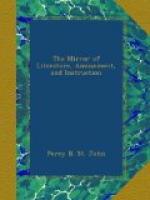Tally is the operation of hauling aft the sheets, or drawing them in the direction of the ship’s stern.
Towing is the operation of drawing a vessel forward by means of long lines, &c.
Timoneer, from the French timonnier, is a name given, on particular occasions, to the steersman of a ship.
Bars are large masses of sand or earth, formed by the surge of the sea; they are mostly found at the entrances of great rivers or havens, and often render navigation extremely dangerous.
The Ox-Eye, so called by seamen, is a remarkable appearance in the heavens, resembling a small lurid speck, and always precedes two particular storms, known only between the tropics.
Azimuth-Compass is an instrument employed for ascertaining the sun’s magnetical azimuth.
Studding-Sails are long and narrow, and are used only in fine weather, on the outside of the large square sails.
Stay-Sails have three corners, and are hoisted up on the stays when the wind crosses the ship.
Broaching-to is a sudden movement in navigation, when the ship, while scudding before the wind, accidentally turns her side to windward.
Wales are a number of strong and thick planks, covering the lower part of the ship’s side.
Scud is a name given by sailors to the lowest clouds; which are mostly observed in squally weather.
The Sheets are ropes used for extending the clues, or lowering the corners of the sails.
Brails are ropes used to truss up a sail to a mast or yard.
Reef-Bands are long pieces of rough canvass sewed across the sails to give them additional strength.
Scudding is a term applied to a vessel when carried furiously along by a tempest.
Leeward implies when the ship lies on that side to which the wind is directed.
Windbound means when the ship is detained in one particular station by contrary winds.
Windward is when the ship is in the direction of the wind.
* * * * *
CHRONICLES OF THE CANONGATE.
(To the Editor of the Mirror.)
Sir,—Since my last communication to you on the subject of the works, so commonly spoken of as by the “Great Unknown”—“the Wizard of the North,” and other equally novel cognomina, the veil has been withdrawn; we now have the open avowal, both from his own lips, and under his own hand, of the authorship from the individual himself, who has so long, and, as it now appears, so justly, enjoyed the reputation of having written them.
To judge from what he says in the second volume of “the Chronicles of the Canongate,” just published—I mean in the character of Mr. Croftangry,—it is clear that he is conscious of such slips and carelessness as I have before pointed out. I am therefore at a loss to understand why he should allow them to remain like spots that deface the general beauty of his productions, as by submitting them for perusal to the merest Tyro in grammar or composition before they were sent to press, they could not fail of being obliterated.




